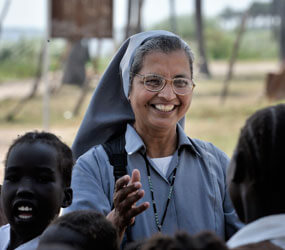MALAKAL, Southern Sudan – As January’s referendum on independence for Southern Sudan approaches, tensions are running high in communities along what many expect will become a new international border with northern Sudan.
Packed buses arrive in Malakal daily with southerners coming home from the North. Church workers report the exodus is fueled by the fear of being attacked should the South vote to separate.
Similarly afraid in any possible post-referendum violence, Arab traders in the town’s market are closing their shops and heading North, causing the price of basic commodities to rise as the flow of commercial goods from Khartoum, the Sudanese capital, grinds to a halt.
Armies from the two sides, camped out here in close proximity, eye each other with mistrust. On the local base of a joint military force – comprising soldiers from both the northern Sudan Armed Forces and the southern Sudan People’s Liberation Army – rumors run rampant of post-referendum alliances and betrayals.
In the rest of the country, far from the contested border, no one is predicting trouble, but in Malakal, capital of Upper Nile state, church leaders are taking the threat of violence seriously.
“Our emergency preparedness program is studying where the flashpoints will be, where we’re likely to have problems, and we’re getting ready to host people should they flee their villages because of clashes on the border,” said Father Peter Othow, coordinator of development and aid for the Malakal Diocese.
“We’re looking particularly at how to provide food and clean water, as well as (at) concerns about health and security,” Father Othow told Catholic News Service. “But if the North decides to start bombing, wherever we put people they’ll be at risk. So we’re working at building the capacity of local organizations, helping them be prepared to act locally, because if the fighting starts up again many of the international NGOs will withdraw their staff from the area.”
The threat of aerial bombing should be taken seriously, said Mill Hill Father Peter Major, a missionary from Skaneateles, N.Y., who has worked in Sudan for three decades. He said the country’s changing politics means Khartoum is having a harder time finding foot soldiers, increasing the likelihood that the northern government will resort to air attacks.
“In the past their soldiers came from Darfur and the Nuba Mountains and from the South itself,” Father Major said. “Most of those aren’t available to them any longer, so this time around the northerners would have to do the fighting themselves, yet they’re not very keen on that.”
Father John Oryem, the justice and peace coordinator for the El Obeid Diocese, a huge territory that encompasses all of Darfur as well as disputed border regions like Abyei, said many of the returnees from the North face difficult choices. They went north to earn money from jobs, most menial, which simply were unavailable in the war-torn South. Yet as January nears, many fear they will suffer revenge from northerners angered by the referendum’s expected approval.
“In their hearts, all of them want to come south, but the financial situation is forcing them to divide themselves. So a family may send the wife and some children to the South. The husband and other kids will stay in the North, but the vulnerable are being sent south,” Father Oryem said.
Those returning to the South are aware of the hardships they are going to face, according to an Indian nun working in Malakal.
“I spoke with some southerners in the North who wanted to return home, and I told them there was no place for them to live if they come back, nor is there health care, and the prices for everything are very high,” said Sister Ninet D’Costa, a member of the Daughters of Mary Help of Christians.
“They replied that they would nonetheless come south and suffer for three or four or five years, but that things will eventually get better. ‘If we remain in the North,’ they told me, ‘we will suffer all our lives,’“ she said.
Sister Ninet came to Malakal to train school teachers as a member of Solidarity with Southern Sudan, a faith-based organization dedicated to training teachers, nurses and pastoral workers. She lives in a house with several of the organization’s volunteers positioned between the bases of the two opposing armies. Twice in the past four years, the two forces have started shooting at each other, so the foreign religious workers are nervous.
A more immediate concern is the rise in prices for basic commodities. Diesel, which comes by barge from Khartoum, is in short supply because the northern government has reduced shipments as a warning against secession. In addition, many Arab traders from the North, who formed the backbone of the local market, have closed their shops and headed home.
The merchants are Muslim, but Father Stephen Nyodho, pastor of Christ the King Parish in Malakal, said that’s not why they are targeted. This close to the fault line between what will likely become two Sudans, Muslims and Christians live side by side without difficulties, he said.
“The traders’ problem is their color,” he said. “We’re black and they are red. When you see a person of different color, the red color, you’re suspicious. Our brothers in the North are mistreated by people of lighter color, and people here are angry about that.”
De La Salle Brother Bill Firman, an Australian and a member of the solidarity team in Malakal, said the government of Southern Sudan has said northerners will be safe.
“The real danger comes from tin pot people running around with guns who think they are big men,” he said. “You have generals with their own militias who shoot up the town and there are no consequences. They need 3,000 things to go right, and only one to go wrong.”


